Community Gardens & Cooking: Cross Programming for Food Security Workshop Recap
go.ncsu.edu/readext?943178
en Español / em Português
El inglés es el idioma de control de esta página. En la medida en que haya algún conflicto entre la traducción al inglés y la traducción, el inglés prevalece.
Al hacer clic en el enlace de traducción se activa un servicio de traducción gratuito para convertir la página al español. Al igual que con cualquier traducción por Internet, la conversión no es sensible al contexto y puede que no traduzca el texto en su significado original. NC State Extension no garantiza la exactitud del texto traducido. Por favor, tenga en cuenta que algunas aplicaciones y/o servicios pueden no funcionar como se espera cuando se traducen.
Português
Inglês é o idioma de controle desta página. Na medida que haja algum conflito entre o texto original em Inglês e a tradução, o Inglês prevalece.
Ao clicar no link de tradução, um serviço gratuito de tradução será ativado para converter a página para o Português. Como em qualquer tradução pela internet, a conversão não é sensivel ao contexto e pode não ocorrer a tradução para o significado orginal. O serviço de Extensão da Carolina do Norte (NC State Extension) não garante a exatidão do texto traduzido. Por favor, observe que algumas funções ou serviços podem não funcionar como esperado após a tradução.
English
English is the controlling language of this page. To the extent there is any conflict between the English text and the translation, English controls.
Clicking on the translation link activates a free translation service to convert the page to Spanish. As with any Internet translation, the conversion is not context-sensitive and may not translate the text to its original meaning. NC State Extension does not guarantee the accuracy of the translated text. Please note that some applications and/or services may not function as expected when translated.
Collapse ▲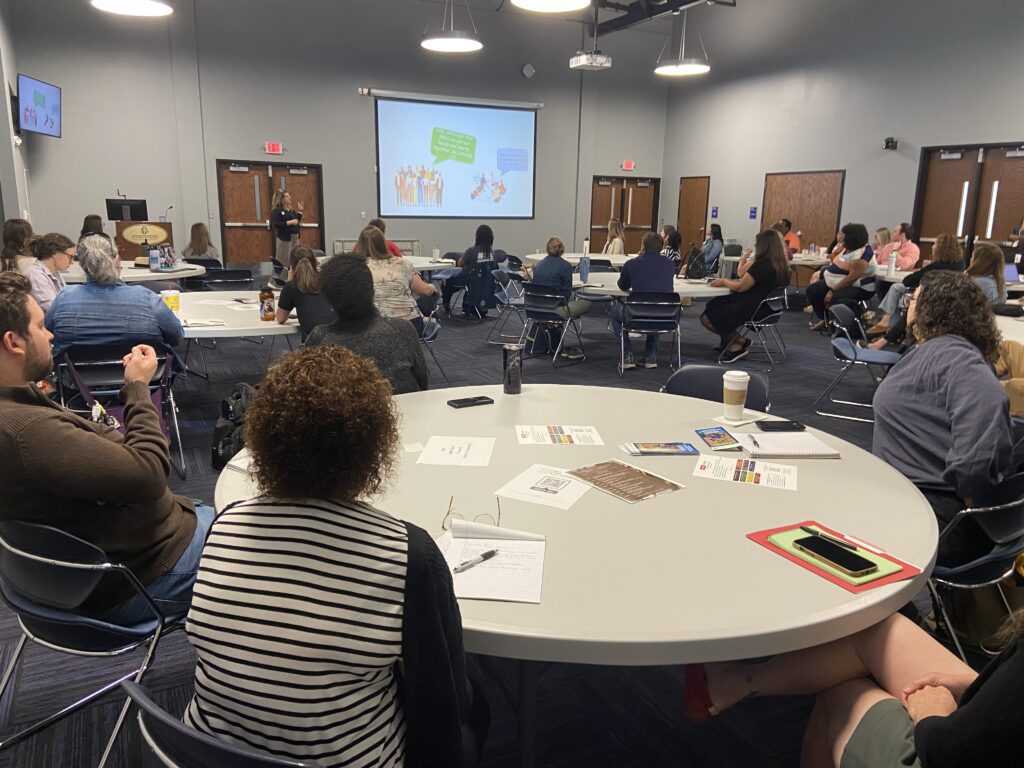 On June 1st, 2023, N.C. Cooperative Extension staff from across the state gathered at the NC A&T State University Farm Pavilion for the Community Gardens & Cooking Workshop hosted by the Food Security Workgroup of the Local Food Program Team (LFPT). The main goal of the workshop was to teach agents, program assistants and associates, educators, and specialists, how to collaborate with others in their office or their community for the common goal of food security with a specific focus on community gardens. Other workshop goals included networking, LFPT recruitment, and to have fun while learning and brainstorming for action in the respective counties. With over 50 attendees, all districts were represented and 31 counties were represented. Program areas represented included: Ag/Hort, CRD, EFNEP, FCS, Local Food, and 4-H.
On June 1st, 2023, N.C. Cooperative Extension staff from across the state gathered at the NC A&T State University Farm Pavilion for the Community Gardens & Cooking Workshop hosted by the Food Security Workgroup of the Local Food Program Team (LFPT). The main goal of the workshop was to teach agents, program assistants and associates, educators, and specialists, how to collaborate with others in their office or their community for the common goal of food security with a specific focus on community gardens. Other workshop goals included networking, LFPT recruitment, and to have fun while learning and brainstorming for action in the respective counties. With over 50 attendees, all districts were represented and 31 counties were represented. Program areas represented included: Ag/Hort, CRD, EFNEP, FCS, Local Food, and 4-H.
Sessions and activities throughout the day were led by a mix of campus and county staff and incorporated all program areas. Topics included: Food Security Terminology, Community Agreements, The People Part of Gardening, Hunger Challenge – Living on SNAP, Voices for Community Change, NC A&T Community Garden Tour, and Examples of Sustainable Community Gardens.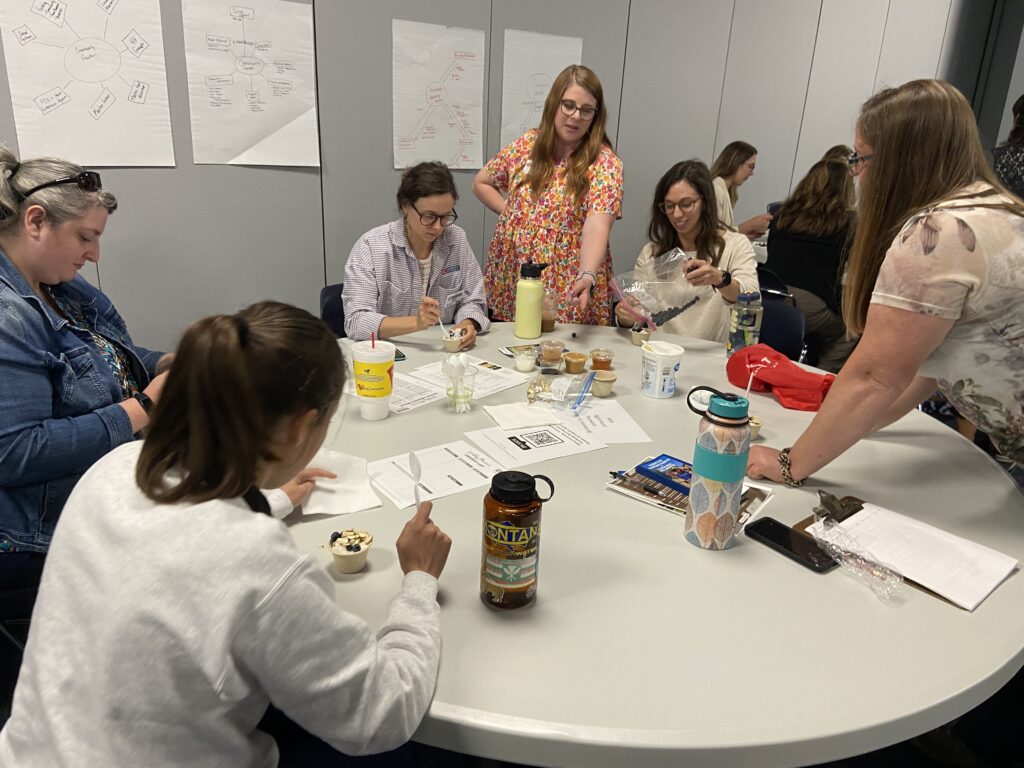 After starting the day with some explanation of terminology and completing a community agreement to let the day be an open space for discussion and growth, we heard from Alyssa McKim, Food Security Coordinator for Guilford County, who shared her expertise on how to connect with partners and develop the social aspect of the community garden. Participants also had a chance to complete an exercise that displays the reality of living on a SNAP budget. This activity was facilitated by Basheerah Enahora, Assistant Professor, Nutrition Education & Behavior Specialist.
After starting the day with some explanation of terminology and completing a community agreement to let the day be an open space for discussion and growth, we heard from Alyssa McKim, Food Security Coordinator for Guilford County, who shared her expertise on how to connect with partners and develop the social aspect of the community garden. Participants also had a chance to complete an exercise that displays the reality of living on a SNAP budget. This activity was facilitated by Basheerah Enahora, Assistant Professor, Nutrition Education & Behavior Specialist.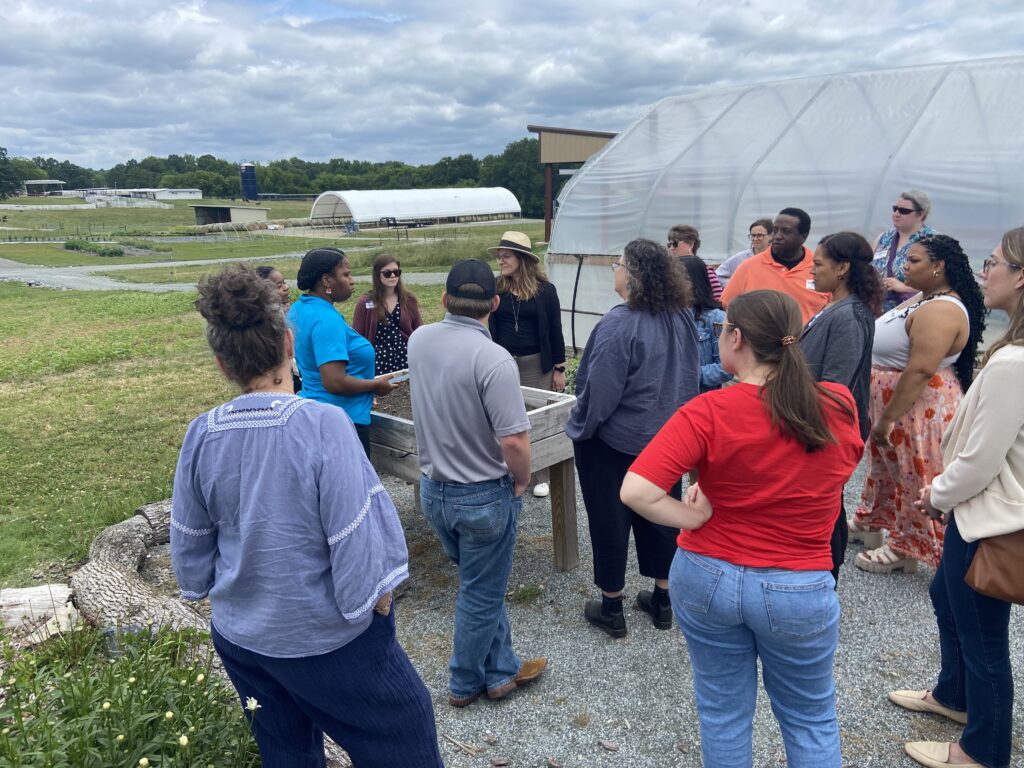 Understanding the social component of a community garden as well as the barriers that are in place in healthy food priority areas, is critical to creating a sustainable community garden that can supplement a diet and contribute to a food secure community. Hearing from Annie Hardison-Moody, Associate Professor and Extension Specialist, about the qualitative research she has conducted, helped many understand the need for understanding the community behind the community garden.
Understanding the social component of a community garden as well as the barriers that are in place in healthy food priority areas, is critical to creating a sustainable community garden that can supplement a diet and contribute to a food secure community. Hearing from Annie Hardison-Moody, Associate Professor and Extension Specialist, about the qualitative research she has conducted, helped many understand the need for understanding the community behind the community garden.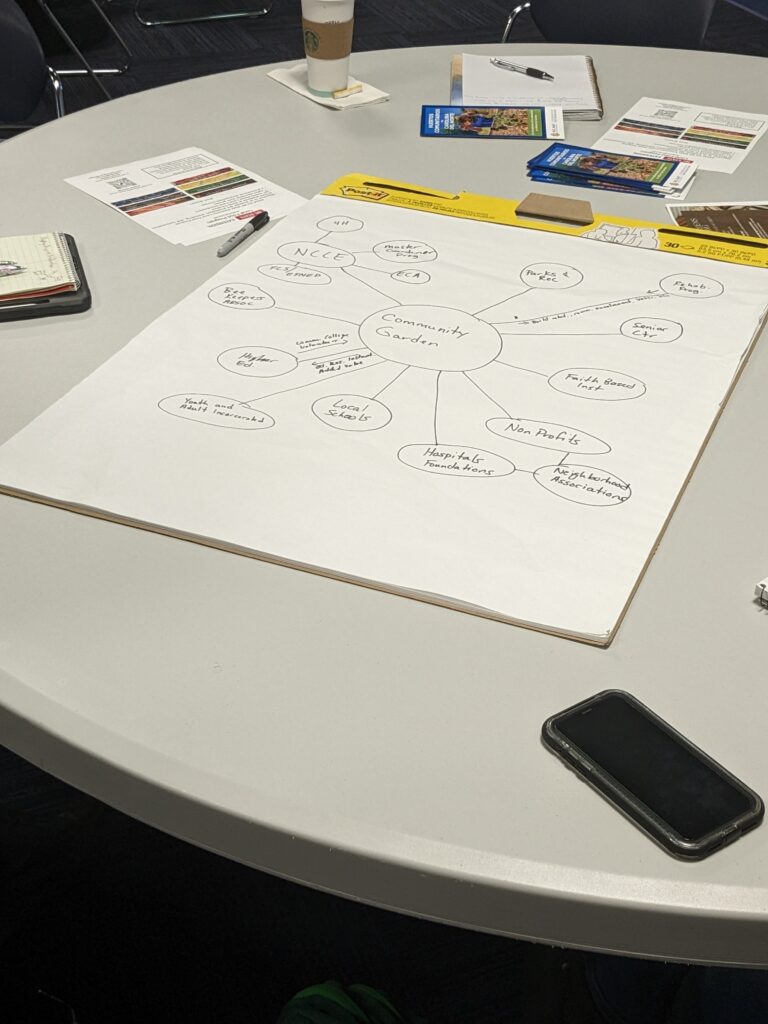 Lunchtime featured a cooking demonstration led by Zac Hackney, Pitt County EFNEP Educator. This demo incorporated an abundance of seasonal produce donated from the Farmville Community Garden in Pitt County. Zac taught the group how using fresh, seasonal produce can amp up a simple budget friendly meal like beans and rice! Lunch featured preserved lemon rice, herb cannellini beans, charred squash and zucchini, parmesan greens, citrus cucumber salad, and a garden salad with a lemon herb dressing.
Lunchtime featured a cooking demonstration led by Zac Hackney, Pitt County EFNEP Educator. This demo incorporated an abundance of seasonal produce donated from the Farmville Community Garden in Pitt County. Zac taught the group how using fresh, seasonal produce can amp up a simple budget friendly meal like beans and rice! Lunch featured preserved lemon rice, herb cannellini beans, charred squash and zucchini, parmesan greens, citrus cucumber salad, and a garden salad with a lemon herb dressing.
Many of the participants expressed how much they enjoyed the cooking demonstration and the activities, particularly the Living on SNAP activity. Surveys revealed that 83% of the people who attended gained knowledge about navigating the social element of community gardening, and 78% of attendees said they gained knowledge of how to work together across program areas to create a holistic community garden. As a result, more than half of the participants feel comfortable to begin incorporating cooking demonstrations into their existing community gardens.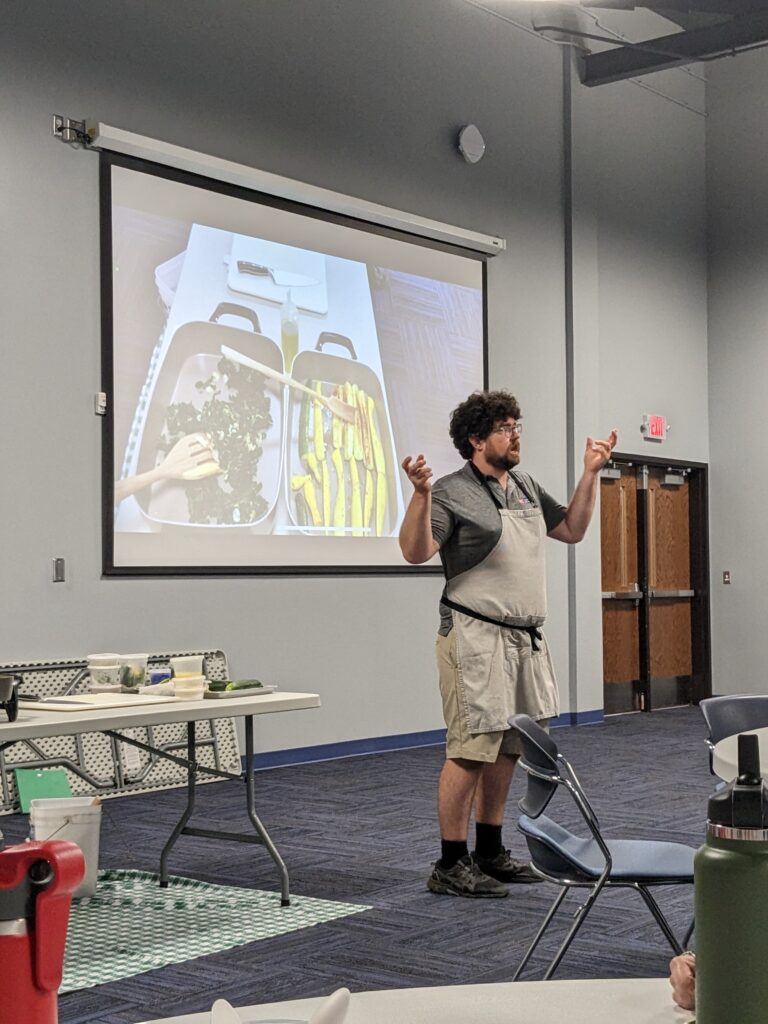
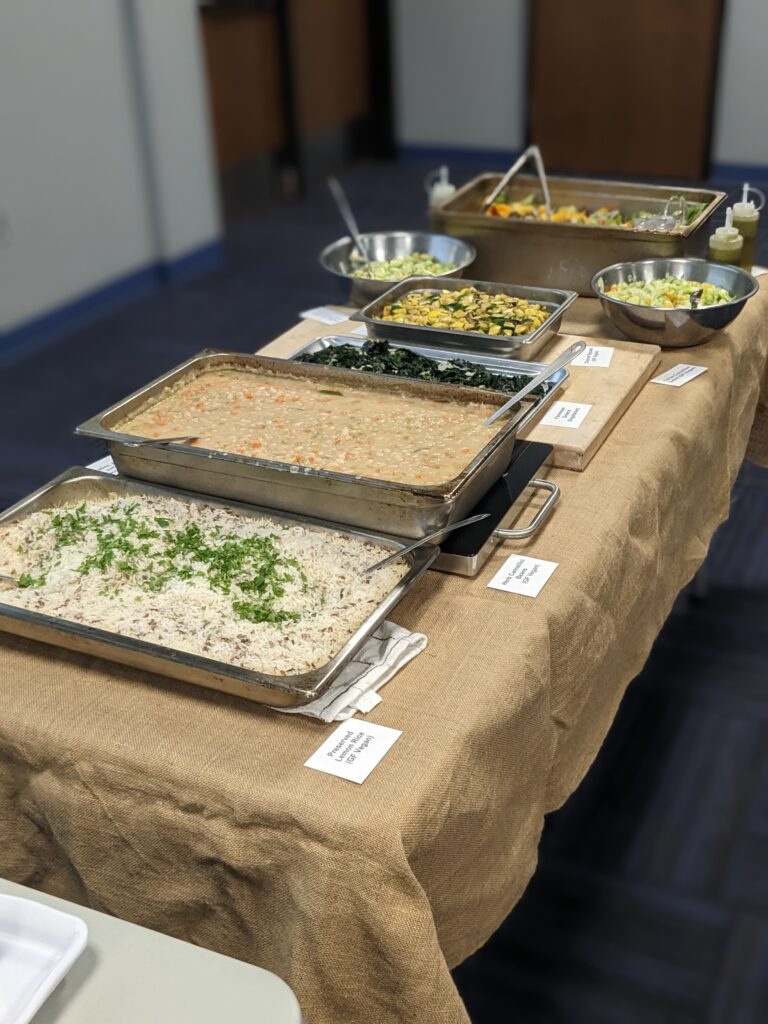 A huge thank you to the planning team and speakers: Tammy Brunelle, Basheerah Enahora, Kim Eshleman, Tara Gregory, Zac Hackney, Annie Hardison-Moody, Kyle Hood, Savanah Laur, Morgan Marshall, Alyssa McKim, Elisa Phillips, and Joni Torres. We also want to thank the Local Food Program Team for the funding and support provided.
A huge thank you to the planning team and speakers: Tammy Brunelle, Basheerah Enahora, Kim Eshleman, Tara Gregory, Zac Hackney, Annie Hardison-Moody, Kyle Hood, Savanah Laur, Morgan Marshall, Alyssa McKim, Elisa Phillips, and Joni Torres. We also want to thank the Local Food Program Team for the funding and support provided.


